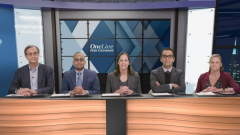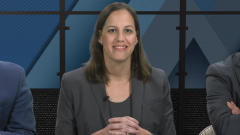
Challenges With Molecular Testing in Metastatic Colorectal Cancer
A comprehensive discussion on the barriers to molecular testing in metastatic colorectal cancer, along with challenges in utilizing these tests in the real-world setting.
Episodes in this series

Transcript:
Kristen K. Ciombor, MD: Dr Raghav, [are there] any other barriers to molecular testing? We’ve talked a little about that already, but is there anything else that needs to be overcome to utilize molecular testing most effectively?
Kanwal P. Raghav, MD: As we’ve discussed, there are multiple applications of ctDNA [circulating tumor DNA], whether it’s minimal residual disease [MRD], monitoring metastatic disease, or any treatment vs looking at acquired genomic alterations, resistance mechanisms, or clinical trials. There are major barriers to them, some of which have been already alluded to. Part of it is education. These are getting complex. What platform to use? How do you interpret it? What does variant allele frequency mean? What is a clonal mutation? What is a subclonal mutation? These are all part of education. In the community, the literature is growing so rapidly that it’s hard to keep up with it. That’s 1 of the barriers to good clinical application of these. A common scenario that arises is if you do ctDNA profiling and see absolutely no mutation, you presume that a patient is wild type for those mutations. But that’s not true because it could be that ctDNA just wasn’t detected in those patients.
The second barrier is cost and the payers. Right now it’s being used in a very select group of patients, but colorectal cancer is a huge disease burden. We started with that, and we started doing ctDNA indiscriminately on everyone. That’s going to add a lot of care costs, unless platforms become inexpensive. They’re getting there, but they’re still not at the point where you can say that this is affordable and valuable. Another challenge is, what’s the right setting? Who are these patients who should get these tests?
Kristen K. Ciombor, MD: These are all great points. We have to think about the impact of these tests on the patient too. For instance, with ctDNA, if we don’t know what to do with the information, how do they know what to expect from the results? That’s tricky because it can cause a lot of psychological anxiety if they have a positive ctDNA test and we say, “We’re not going to do anything at this time with that information.” We owe it to our patients to utilize this very carefully.
Joel R. Hecht, MD: In this setting, what would you order today? The patient-informed [test] presumably would miss this because most of these mutations are novel. If I’m in clinic and I have someone who’s been off an anti-EGFR, what would you do? I don’t know if we’re supposed to say, but what type of platform would you order? Would you order 1 that’s a broader panel? Also, is it 1 that you’d get back over time to make that decision? I don’t know. We don’t have those EGFR-resistance panels, at least I don’t at my institution, and I don’t know how to order that. This is all really interesting, but I don’t know how to use it next week.
Kanwal P. Raghav, MD: I’m happy to hear what others feel. I don’t see any reason why I would choose 1 platform over the other. If the question is centered on acquired resistance for ctDNA and rechallenge with cetuximab or panitumumab, I don’t think I’d choose anything that you’re familiar with, anything that’s accessible to your patients.
Pashtoon M. Kasi, MD: It brings up an important point. It sounds pretty basic, but we’ve seen NGS [next-generation sequencing] panels ordered for the MRD question. We’ve also seen MRD panels ordered for the EGFR-resistance mechanism question. It’s more realized. As long as it’s an NGS panel-based assay, it will be ideal for the EGFR rechallenge question that Dr Raghav was mentioning. Knowing the platform, what are the drawbacks? That applies to liquid as much as tissue. From what Dr Raghav was alluding to earlier, for NGS as well as MRD-based, the question is the interpretation of the negative report. That’s the part where Dr Ciombor refers to the informed negative vs the uninformed negative. If you don’t have the shedding, which could be falsely interpreted as wild type, it may or may not be a true negative report.
Joel R. Hecht, MD: We see this all the time because many of the platforms are paired liquid as well as tissue informed. Even though the tissue might be from before, usually you find a lot more in the tissue—without mentioning names—rather than in the liquid 1.
Kanwal P. Raghav, MD: You brought up an important part. If you think about this as any test, there’s a correct diagnosis and an overdiagnosis. Yes, you can test. But if we’re not able to come up with good therapies for those patients, then it can lead to anxiety and more testing than is necessary. We need to establish good clinical trials that can show outcome improvements, and not just [something that looks] great in the initial stages, when we have prognostic implications. At the end of the day, you have to demonstrate outcomes that improve. That’s the only way to establish value of any technology. In the metastatic setting, individuals are commonly using ctDNA dynamics to change treatments way too early, outside the purview of clinical trials.
Joel R. Hecht, MD: It’s reinventing the CEA [carcinoembryonic antigen]. I don’t want to rag on the community, but we’ve seen individuals who change treatment—even though the patient is doing fine from a CT scan standpoint—because the CEA bumped up a little. We hate to recapitulate our problems from before.
Joleen M. Hubbard, MD: Pashtoon, you brought up a good point about shedding. I don’t think a lot of individuals realize the difference in shedding. If you have liver metastases, those shed very frequently. You can have a good amount of ctDNA. But if you have lung metastases or even peritoneal metastases, you can be falsely reassured that these mutations don’t exist or don’t have as high a burden of disease based on the location. We need to keep that in mind as well.
Kanwal P. Raghav, MD: I had a recent personal experience with this. One of my family friends had lung cancer—no risk factors, no smoking, and an Asian ethnicity. They did ctDNA testing because they couldn’t get the tissue, and there was no EGFR mutation. Fortunately, the oncologist said, “There’s no way this can happen.” This was an EGFR-driven tumor without any risk factors. They ordered another ctDNA profile, and that showed EGFR mutation. In this case, there could have been a lot of difference in how we treat someone, right?
Kristen K. Ciombor, MD: Very high stakes.
Kanwal P. Raghav, MD: Like any other test, [ctDNA] has advantages and drawbacks in understanding. That’s why the No. 1 challenge in good clinical applicability is good education.
Joel R. Hecht, MD: You brought up a good point, and we’re beginning to see the patients. I’m curious what others are [doing]. Are the patients someone who’s MRD positive and scans negative? Someone brought up the effects on the patient. We still haven’t proven that. It’s been hard to prove that CT scans, which we do all the time, improve outcomes. Only in a minority of patients, where you find it early, does the patient go to surgery and get cured. But you wouldn’t have found it early if you hadn’t been doing scans. Those are old data, even though it’s in the NCCN [National Comprehensive Cancer Network] Guidelines, that every-6-month CT scan make any difference at all. We have individuals who are waiting for the other shoe to drop. Most of the time it will, but that’s a difficult group that we didn’t have a couple of years ago in our clinics.
Transcript edited for clarity.







































